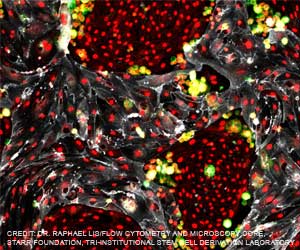
‘Epigenetic regulator Phf19 plays an important role in hematopoietic stem cells differentiation and development. Absence of phf19 results in imbalance of blood cells and aging.’
Read More..Tweet it Now
Blood diseases affect a large part of the worldwide population. One in four people suffer from anemia, 17 out of 100,000 have hemophilia and 2.5 out of 100 tumors that are detected worldwide are leukemic in nature. All these abnormalities are the result of malfunctioning blood cells or imbalances in the composition of blood tissue.Read More..
Maintaining blood tissue balance is complex because each cell has a different lifespan. White blood cells last 5 to 20 days while red blood cells last 120 days. To renew each of these cell types in the face of a threat such as a wound or bleeding, HSCs, which normally remain dormant, begin to divide and produce specialized cells to maintain the balance of blood tissue.
The process of transition from HSCs to specialized cells is regulated by epigenetic factors, that is, proteins that determine which genes that are expressed at each moment and cellular tissue.
For this reason, the group of CRG researchers led by Luciano Di Croce studied the Phf19 gene, which is part of a large group of epigenetic regulators.
"Bone marrow cells are constantly dividing and are very sensitive to environmental factors such as radiation or chemotherapy," explains Arantxa Gutiérrez, co-first author of the article.
Advertisement
In the study published in Science Advances, CRG researchers describe the role of the epigenetic regulator Phf19 in maintaining HSCs.
Advertisement
The researchers found that under normal conditions, the mouse's life was healthy, but in certain situations such as undergoing transplants or ageing, the difficulty of producing differentiated cells compromised the proper functioning of blood tissue. In the long term, animals lacking Phf19 accumulated disorders in the composition of blood compatible with the early stages of leukemia.
"The vast majority of studies that have been done so far have removed all the biochemical functions from the multi-protein complex of which Phf19 is part of. We have taken a subtler approach by eliminating a single gene, allowing us to discover a unexpected role in the regulation of MHC," explains Luciano Di Croce, lead author of the study.
"Until now it was known that ageing conditioned the quantity and activity of the Phf19 protein and other proteins of the complex that it is part of, both in mice and in humans" says Di Croce. What was not known is that Phf19 controls HSC activation to begin to specialize.
According to Pedro Vizán, co-first author of the study and recipient of a grant from the Asosiación Española Contra el Cáncer (AECC) for this research, "the study of the processes by which stem cells regulate genetic information to produce specialized cells is essential for understanding how cells acquire pluripotence and proliferation capacity, key characteristics to form tumors".
Now we have seen that "the lack of Phf19 increases the probability of suffering disorders in the composition of the blood. That is why we are studying its possible role as a precursor of tumors or whether it would be an anticancer therapeutic target."
Source-Eurekalert














